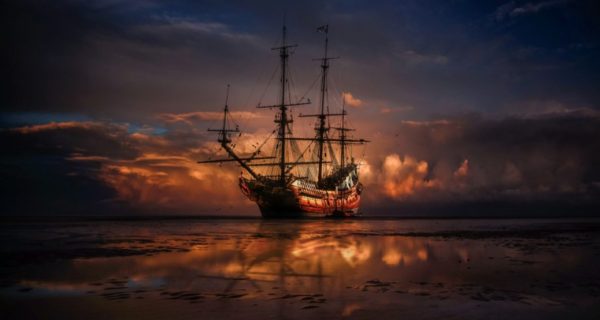So I just recently watched Pirates of the Caribbean: The Black Pearl for the first time. Yes, I know, where have I been? Well, that’s a very long story, one which I don’t have time for. It got me thinking about piracy, and pirate life. What kid hasn’t thought about what life would be like as a pirate on the high seas, at least once in their life? The freedom, the danger, the romance– but is that at all what pirate life was like? I mean, obviously, cursed treasure and ghost ships are pure fiction, but what about other aspects of pirate life? Shiver me timbers, walk the plank, and all that. Well, I’m going to apply my skills as an (armchair) historian, and my encyclopedic knowledge of sea shanties to discover the truth.
First of all, as any historian (armchair or otherwise) will tell you, real life is not nearly as glamorous as Hollywood portrays it. The image we have of pirates was essentially concocted by Robert Louis Stevenson and Walt Disney. Expressions like “yo-ho-ho” and “shiver me timbers” and, of course, “arr” were not in common usage during the Golden Age of Piracy. Furthermore, the “pirate accent” is purely fiction. Pirates came from all over the world, and had a variety of accents and dialects. In the Walt Disney movie adaptation of Treasure Island, Robert Newton portrayed Long John Silver. Robert Newton came from the West Country, a portion of England located just south of Wales, and lent his distinctive West Country accent to the character. So, sorry to disillusion you, but not all pirates talked like that. By the way, you know who else was from West Country? David Prowse, the “body” of Darth Vader. But I digress.
Hollywood pirates are commonly seen seeking gold and glory, but unfortunately, pirate booty was usually significantly less glamorous. The main goal of a pirate vessel was just to stay afloat, and it’s awfully hard to do that if your crew is starving. Most of what pirates stole was pretty commonplace stuff, like food, or in many cases, rum. Many, many cases.
Getting back to the Pirates of the Caribbean, we see Jack Sparrow as master of his ship, and he consistently refers to it as his ship, as though he owned it. Many fictional pirate captains are portrayed as authoritarian leaders, such as Captain Hook, but pirate ships just weren’t run like that. Pirate ships were more like joint stock companies; each member of the crew owned a stake in the ship, and was entitled to a vote on how the ship was managed. Because pirate ships were run in this manner, every member of the crew was entitled to a part of the loot, so no giant chests of buried treasure. The captain was an elected official; he could be voted in or voted out at any time. Pirates were much more democratic than Hollywood would have us believe.
Take, for example, the case of Bartholomew Roberts, the dreaded pirate. Yes, that’s right, Dread Pirate Roberts was a real person, and possibly the best pirate of all time. Roberts worked on a merchant vessel as a youth, which was captured by pirates. The pirates noticed his skill as a navigator, and eventually voted him in as captain. Yes, just like Westley.
One of the prominent features of the Pirates of the Caribbean is the Pirate’s Code. When I saw the Black Pearl, I honestly thought this was yet another in a series of historical errors, but I came to find out this is probably the most accurate part of the movie. Several pirate ships had their own sets of rules including Bartholomew Roberts’ ship. These codes usually covered how the treasure was divided up, or how pirates settled disputes among the crew. Most offences were punishable by being marooned on an uninhabited island.
All this is not to say that I did not enjoy Pirates of the Caribbean; I found the movie very entertaining. I’m certainly not one of those sticks in the mud that has to ruin everything because it’s not accurate. I firmly believe that we should indeed indulge in fantasy. I also believe that we should realize that it is fantasy, and should not think that it is any reflection on what real a pirate’s life was like. So go ahead and enjoy yourselves, but never forget that you’re watching a fantasy.

